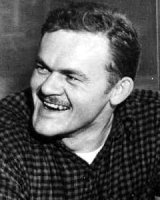From Here to Eternity is the debut novel of American author James Jones, published by Scribner's in 1951. It is loosely based on Jones' experiences in the pre-World War II Hawaiian Division's 27th Infantry and the unit in which he served, Company E ("The Boxing Company"). Fellow company member Hal Gould said that while the novel was based on the company, including some depictions of actual persons, the characters are fictional and both the harsh conditions and described events are inventions.
From Here to Eternity won the National Book Award and was named one of the 100 Best Novels of the 20th century by the Modern Library Board. There were three screen adaptations (below).
Plot

Set in the summer and autumn of 1941 at the Schofield Barracks in Hawaii, the story follows several members of G Company, including Captain Dana “Dynamite†Holmes and First Sergeant Milt Warden, who begins an affair with Holmes' wife Karen. At the heart of the novel lies a struggle between former bugler Private Robert E. Lee Prewitt, an infantryman from Kentucky and self-described "thirty-year man," (a career soldier) and his superiors. Because he blinded a fellow soldier while boxing, the stubborn Prewitt refuses to box for his company’s outfit and then resists the "Treatment," a daily hazing ritual in which the non-commissioned officers of his company run him into the ground.
The central characters are essentially similar in all three of Jones' World War II novels, though their names are somewhat altered. From Here to Eternity features Warden and Prewitt, who become Welsh and Witt in The Thin Red Line (1962) and Mart Winch and Bobby Prell in Whistle (1978). Similarly, Corporal Fife in The Thin Red Line reappears as Marion Landers in Whistle, as does the cook, Maylon Stark, who becomes Storm, then Johnny "Mother" Strange. Stark was the object of an error of chronology in Chapter 16 of the book when on the company's first foray off of the Schofield Base, he is greeted by Mrs Kipfer at the New Congress Hotel, a house of prostitution, as an old, long time customer. What is overlooked is the fact Stark has just transferred into the company from Fort Bliss in Texas and this is his first tour to Hawaii.
Title

The title was inspired by a line from Rudyard Kipling's poem "Gentleman Rankers"
- Gentlemen-rankers out on a spree,
- Damned from here to Eternity,
- God ha' mercy on such as we,
- Baa! Yah! Bah!
Late cuts

In 2009, the author's daughter, Kaylie Jones, revealed that her father had been compelled to make a number of pre-publication cuts, removing some expletives and some gay sex passages. A new edition of the book with the previously censored passages restored was published by Open Road as an e-book in May 2011. It was subsequently released in physical format in 2013 by Penguin as part of their Modern Classics Collection.
Reception

From Here to Eternity won the third annual U.S. National Book Award in 1952.
Joan Didion has written many articles and essays praising From Here to Eternity, the most famous of which is "In the Islands", reprinted in The White Album (1979) and in Collected Nonfiction (2006).
The novel is number 62 on the Modern Library 100 Best Novels list.
Adaptations
Television and film
From Here to Eternity was adapted as a 1953 film of the same name, directed by Fred Zinnemann and produced by Buddy Adler, starring Burt Lancaster and Deborah Kerr in the famous sex scene.
It was adapted twice for television, as a miniseries of the same name in 1979 and as a series of the same name in 1980.
Stage
A musical adaption of the novel opened at the Shaftesbury Theatre in London in October 2013.
References


